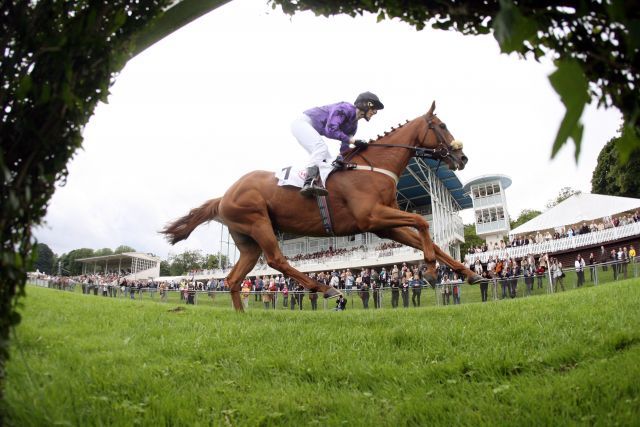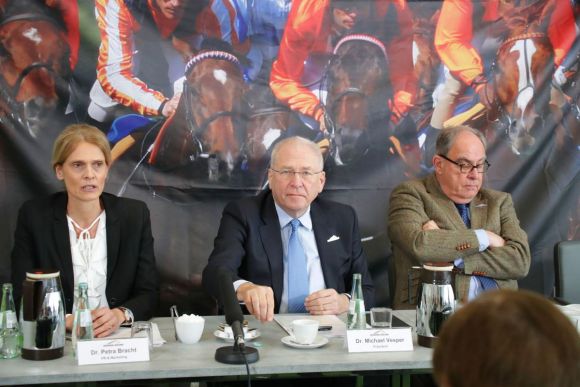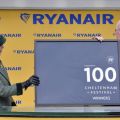Folgen
@turftimes folgen
Drucken
Redaktion
Startseite
Verwandte Artikel:
18.04.24
Last weekends racing in Dusseldorf featured Germanys first Group race of the year. The Frühjahrs-Meile (1mile) for 4-year-olds and upwards attracted a strong field of twelve including two from France, Gamestop (Lope de Vega) from... weiterlesen »
16.04.24
Die Jenny Wiley Stakes (Gr. I) am vergangenen Samstag in Keeneland/Kentucky waren aus hiesiger Sicht eigentlich nicht von besonderem Interesse. Ein über 2000 Meter führendes Rennen für vierjährige Stuten mit der aus Newmarket angereisten... weiterlesen »
16.04.24
Die Grand National in Aintree war in der Vergangenheit nicht unbedingt das erfolgreichste Ziel für Trainer Willie Mullins, seine Siege erzielte er vorzugsweise in den Gr.-Rennen in Cheltenham oder in seiner irischen Heimat. Was nicht... weiterlesen »
11.04.24
This was one of the weekends when I thought I would not have much to write about. But surprise, surprise even with moderate racing at Mannheim, a small German country track and then an average card in Mulheim an der Ruhr, there was just... weiterlesen »
03.04.24
Well last weekend’s racing ended as we expected it would. Berlin-Hoppegarten opened its gates to 12.500 racing fans and friends, and they were treated to some fine racing so early in the turf season. It’s not often anywhere in the world,... weiterlesen »
27.03.24
It´s nice to get back writing this article again as it means we have got through the winter and can look forward to hopefully another exciting grass season.Dortmund kept us going as usual in Winter and though it cared for the German racing... weiterlesen »
19.03.24
Einen Tag Auszeit nahm sich Willie Mullins vergangene Woche beim Festival in Cheltenham: Am Donnerstag gewann der irische Champion kein Rennen. Um zum Finale noch einmal zuzuschlagen. Durch drei Siege inklusive des Cheltenham Gold... weiterlesen »
14.03.24
Wer geglaubt hatte, die irischen Gäste würden sich an den ersten Tagen beim Cheltenham Festival nicht an den vorgegebenen Fahrplan halten, der eine komplette Dominanz vorsah, der sah sich getäuscht. Willie Mullins und Co, beherrschten die... weiterlesen »
29.02.24
Es gibt sie, die netten Beiträge über den Galopprennsport. Besonders rührig sind einige Rennställe und Gestüte, die Videos posten und ihre Pferde vorstellen. Dito Rennvereine. Auch der Verband bemüht sich, stellt beispielsweise die „Ex-... weiterlesen »
18.01.24
With this being the first issue of the New Year, I would like to start off by wishing all our readers a happy and prosperous 2024. One of the unfinished pieces of the 2023 race season, was the trainers championship which went down to the... weiterlesen »
Block: Sidebar Square
Google AdSense 250x250
Google AdSense 250x250
Termine
So.
14.04.
14.04.
Sa.
20.04.
20.04.
So.
21.04.
21.04.
13:00 Uhr - Renntag
Köln - 2. Renntag
Carl Jaspers Preis, Gr. II | Karin Baronin von Ullmann - Schwarzgold-Rennen, Gr. III
Köln - 2. Renntag
Carl Jaspers Preis, Gr. II | Karin Baronin von Ullmann - Schwarzgold-Rennen, Gr. III
So.
21.04.
21.04.
So.
28.04.
28.04.
So.
28.04.
28.04.
Mi.
01.05.
01.05.
Mi.
01.05.
01.05.
Mi.
01.05.
01.05.
So.
05.05.
05.05.
So.
05.05.
05.05.
Do.
09.05.
09.05.
Do.
09.05.
09.05.
Sa.
11.05.
11.05.
So.
12.05.
12.05.
So.
12.05.
12.05.
Sa.
18.05.
18.05.
So.
19.05.
19.05.
Mo.
20.05.
20.05.
Mo.
20.05.
20.05.
Sa.
25.05.
25.05.
So.
26.05.
26.05.
Do.
30.05.
30.05.
Fr.
31.05.
31.05.
Sa.
01.06.
01.06.
So.
02.06.
02.06.
Sa.
08.06.
08.06.
So.
09.06.
09.06.
So.
09.06.
09.06.
So.
09.06.
09.06.
Sa.
15.06.
15.06.
So.
16.06.
16.06.
So.
16.06.
16.06.
Do.
20.06.
20.06.
Sa.
22.06.
22.06.
So.
23.06.
23.06.
Mo.
24.06.
24.06.
Sa.
29.06.
29.06.
So.
30.06.
30.06.
Mi.
03.07.
03.07.
Do.
04.07.
04.07.
Sa.
06.07.
06.07.
So.
07.07.
07.07.
10:30 Uhr - Renntag
Hamburg - 5. Renntag
Idee 155. Deutsches Derby, Gr. I | BBAG Meiler-Auktionsrennen, Kat. C | BBAG Steher Auktionsrennen, Kat. C
Hamburg - 5. Renntag
Idee 155. Deutsches Derby, Gr. I | BBAG Meiler-Auktionsrennen, Kat. C | BBAG Steher Auktionsrennen, Kat. C
Sa.
13.07.
13.07.
So.
14.07.
14.07.
So.
14.07.
14.07.
Sa.
20.07.
20.07.
So.
21.07.
21.07.
So.
21.07.
21.07.
Do.
25.07.
25.07.
So.
28.07.
28.07.
So.
28.07.
28.07.
So.
28.07.
28.07.
Block: Adsense 728 x 90
Google AdSense 728x90
Google AdSense 728x90
Impressum - Datenschutzerklärung - Kontakt
©2010-2013 Dequia Media in Kooperation mit Turf-Times















